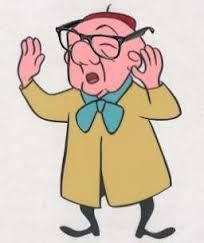
A question that gets asked often in backpacking circles is, “How do I deal with my glasses/contacts on backpacking trips?” It’s a great question, especially for those who are new to backpacking or those who just got their first pair of glasses or contact lenses.
The bad news is there isn’t a good answer. This is one of those things you just have to figure out for yourself.
In this post, I’ll share my personal experiences. Probably best if you don’t expect an “ah ha” moment. On the other hand, I might share something you haven’t thought about or tried. For those who don’t need vision correction, you might want to read this anyway because the odds are you will need vision correction in the future.
It seems that most backpackers who already wear eye glasses or contacts mostly stick with what they normally do at home or at work. One exception is many contact lens wearers often opt to carry a pair of glasses as a backup. Keep in mind that a backup piece of gear is really a redundant piece of gear and adds extra weight.
Sense Perception
For humans, all knowledge primarily comes from our sense perception and language. Our most important sense is sight, and what is even more amazing is that if we have a diminished sense, or lack one or more altogether, we have the ability to heighten the remaining senses. As improbable as it may seem at first thought, there are people who are legally blind who can still backpack, and some of them, even hike solo. For most of us who spend a lot of time outdoors, it is our vision that is most important to the experience.
Let’s face it, as we get older our eyesight declines. Even if we had perfect vision in our youth, most people begin to experience declining eyesight in their ‘40s. The Vision Council of America states that approximately 75% of adults use some kind of vision correction.
In case you are wondering about my qualifications or expertise in this realm…
- I have had two eyes for almost 70 years
- I always get near-sighted and far-sighted mixed up
- I had to get glasses in my mid 40s
When I was in the Air Force my vision tested at 20/15. What this means is what most people can see at 15 feet I could see at 20 feet. This measurement really doesn’t tell us a lot, as it only measures one aspect of vision.
Then, in my early 40s, all of a sudden, I began to have difficulty reading the numbers on the “car toppers” we would put on the roofs to identify the vehicles parked in our lot (this number was copied on a key tag and also placed on the repair order).
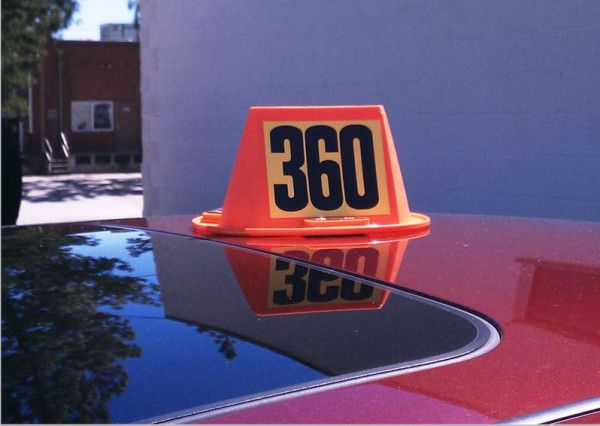
About the same time I noticed I could no longer read the sign on the bus stop across the street from our shop and also began having difficulty reading street signs. To compound this, I could barely read small print on documents or labels on food packages. I was falling apart as middle age crept up on me.
Time to see an optometrist, who confirmed that I needed eyeglasses.
Solutions
At the time, as today, there were three options
- Eyeglasses
- Contact lenses
- Lasik surgery
Eyeglasses
This is the most common vision correction method, with around 64% of the population using glasses. Since I needed help reading and for seeing things at a distance my options were bifocals or progressive lenses. I have always worn progressive lenses.
Contact Lenses
Another option for me was contact lenses. In comparison to eyeglasses, about 11% of the population use contacts, either solely or in combination with glasses. At the time, I don’t remember disposable contact lenses being available; for me keeping contact lenses clean in the auto shop environment would be difficult at best. Plus they seemed to entail a lot of maintenance (cleaning). Even when disposable lenses became common they still did not seem to be a good solution for me, not to mention I hate to use anything disposable. From what I have read, contacts provide better vision, especially at the peripheral of our sight.
Lasik Surgery
In the mid 1990s, when I needed glasses, Lasik was fairly new and seemed to me to have too much risk. Even today there is risk with this surgery and is not something I would consider – many would disagree!
Eyeglasses in use
Once I had my new glasses, and for the next 20+ years, I wore them almost all the time, even when I really didn’t need them.


There was one exception… I didn’t wear glasses when backpacking or camping.
I could see well enough without them, not needing to focus onto details all around me, and there was no difficulty walking without glasses on any kind of terrain. However map reading was a different story – I needed glasses. Back in the mid 2000s I bought this pair of very light non-prescription reading glasses at a drug store (obviously to save weight!).

Not only are these eyeglasses light and inexpensive, they are compact. Perfect for reading maps or repairing gear, such as threading a needle to do an in-field sewing repair. They also come in a lightweight hard case.
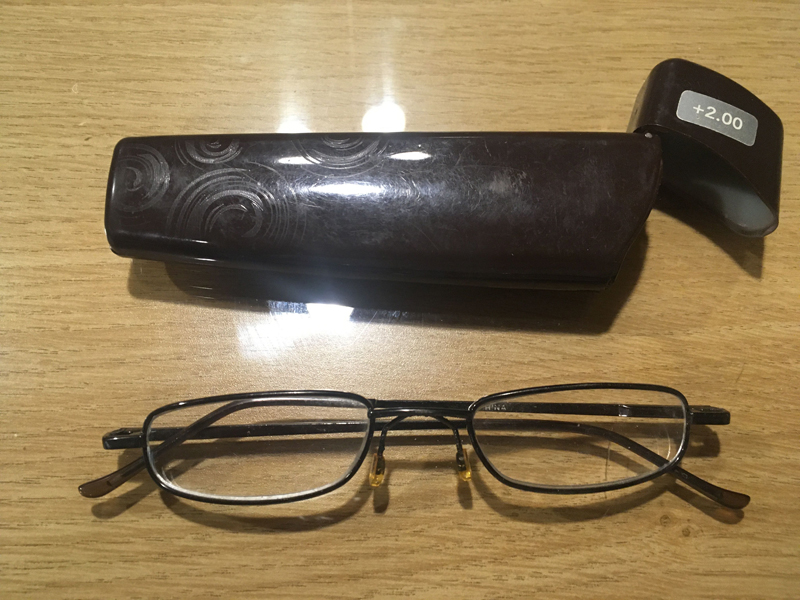
Every so often, when I got a new pair of prescription glasses, I would try them out on a hike, and always found I just hated wearing glasses. I did this in 2011 with a new pair. I think this was the last time I wore prescription glasses on a trip.
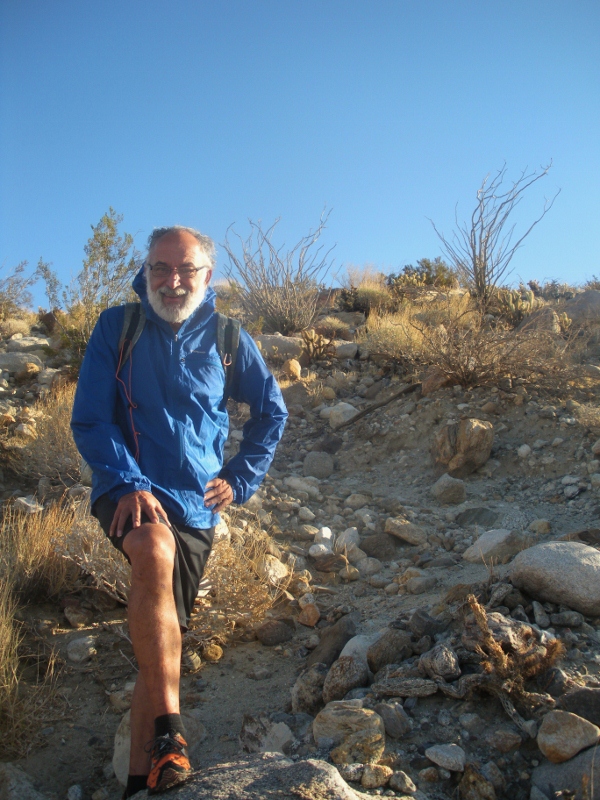
Comfort
I never had a pair of glasses that were comfortable, meaning being able to wear them all day without any sort of discomfort, irritation or “hot spot.” In other words, I never had glasses I could wear all day without noticing them. I tried – many times. Different frames, constant re-fitting by the optometrist and even super lightweight glasses made from titanium frames and plastic lenses. Every one was an irritant at some point during the day.
When I first tried backpacking with glasses, sweat would get on the lenses requiring me to clean them several times a day. So after a couple of trips I gave up. The good news is I got along just fine without them.
Straps to Hold Glasses
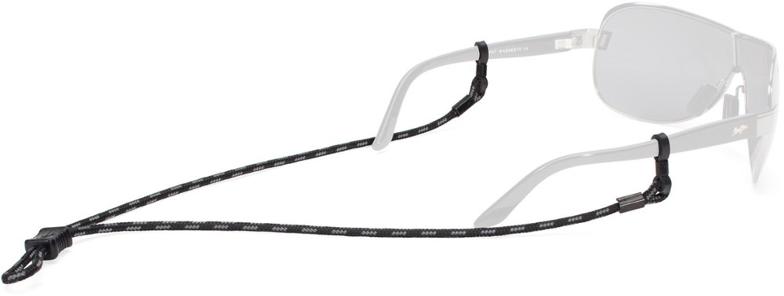
This website may be compensated for linking to other sites or for sales of products. As an Amazon Associate I earn from qualifying purchases.
Some people like to use some sort of strap to keep glasses secure, which also work to keep them around your neck if you need to take them off for a while. I never had a pair of glasses that needed this extra security, and they just ended up in the way if dangling from my neck often becoming a catch basin for dripping perspiration. You mileage may vary.
I do notice many people just push their glasses up above their forehead if they need to operate without glasses for a short period of time. This doesn’t work for me either – if they don’t fall off, they get dirty with body oils or sweat. Again, this may work for you.
Cleaning Glasses & Keeping Them Clean
Speaking of dirty glasses, on the trail you are going to need to clean them periodically. Instead of a special cleaner, plain water works for me. For many years I just used toilet paper, which was better than ordinary tissues. Some tissues can scratch glasses.
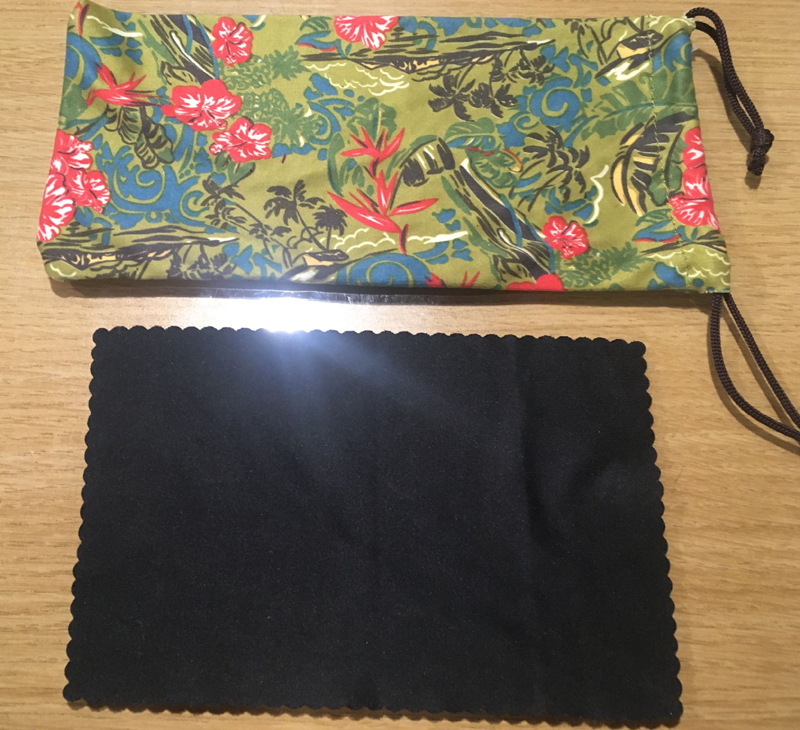
In recent years I have used a small square of microfiber cloth to clean glasses. An option to keep them clean when not in use is to store your glasses in a microfiber pouch, if you don’t require a hard case for protection.
“Foggy” Glasses
When I would work in humid places, it was not uncommon for my glasses to “fog up,” requiring me to take them off intermittently and wipe off the condensation. I have heard that people who hike in humid climates have this problem at times. One solution I have heard that works is a commercial anti-fog spray. I can’t validate whether or not these types of products are effective.
Sunglasses
I rarely wear sunglasses. People with brown eyes are less sensitive to sunlight; my eyes are brown so sunlight doesn’t bother me unless I am driving a car and the sun is low on the horizon shinning directly into my face.
After many years of cheap sunglasses, I went to a sunglass store many years ago and bought a pair of polarized Maui Jim Voyagers (now discontinued), which are the most comfortable sunglasses I have ever found. I’ve had them for a long time. They hold up, although I don’t wear them much – only for driving when the sun is directly in my eyes or sometimes when fishing – nope, the polarized glasses don’t really help see the fish in the water. Similar to the Voyager is the current model Spartan Reef.

Similar to the Voyager is the current model Spartan Reef.
Bifocal Sunglass Readers
Another thing I tried, after buying my Maui Jim Voyagers, was a pair of non-prescription bifocal “reader” sunglasses made by Maui Jim.

Even though I really liked these, I quit taking them on backpacking trips because when I needed to read a map, I would usually stop in a shady spot to study the map and wearing sunglasses in the shade was too difficult.
Tinted Safety Glasses
A good friend on mine just buys inexpensive safety glasses.

Prescription Sunglasses
The most expensive option, and for some the best option. Many companies, like Maui Jim, sell frames only that you can have your optometrist fit with prescription lenses.
Another option is to buy prescription glasses online (plain or sunglasses). I’ve had really good luck with Zenni Optical. The have a measuring tool for sizing and you simply enter your measurements, your information from the prescription most optometrists provide after an examination, and pick your frames. Turn around time is normally just a few days.
Goggles & Glacier Glasses
When hiking on snow on sunny days, especially at altitude, eye protection can be critical to prevent damage to the eyes. For many years I have used a pair of Julbo Glacier Glasses with great success and satisfaction.

When it begins to snow hard or the wind starts blowing the snow off the ground the only effective tool is a pair of goggles. Many goggles allow one to wear their eyeglasses underneath. The trick with goggles is to find a pair that won’t fog up in harsh conditions. I’ve been happy with a reasonably priced pair of Bolle goggles which have a venting system and anti-fog treatment. However, they aren’t 100% fog-proof; weather conditions and the amount of exertion are important factors.
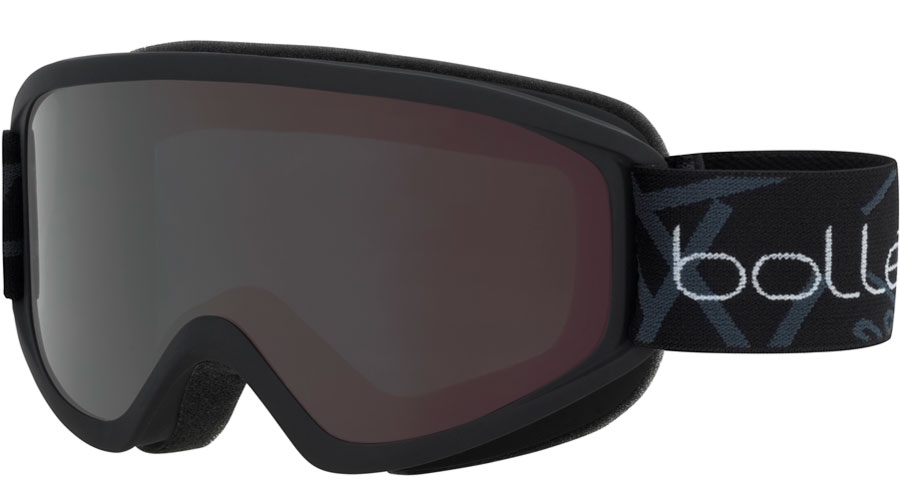
Dealing with Glasses When You Sleep
Many tents come with little storage pouches, but I rarely use a tent, opting for some sort of tarp, or most of the time I just sleep under the stars.
For decades I have just put small items I might need at night in my shoes, such as a headlamp, lip balm, watch, or even my reading glasses. This way they are close at hand and easy to find in the dark. If I have to get up during the night, normally barefooted works. Should there be a need to put on shoes, it is easy to place the nighttime goods on my sleeping bag for a few minutes.
Summary
I can’t give you a real solution, because needs vary by individual. Hopefully if you are trying to figure out something that works for you, I’ve planted the seed for things to think about. If you don’t need glasses now, odds are you will need some sort of vision correction in the future.
Restoring My Eyesight to Normal
I retired a little over 5 years ago and decided to see if I could exercise my eyes and make them stronger. It seemed to me that wearing glasses might make the eyes weak, and ditching my glasses full time might force them to work harder and maybe improve.
There are many websites that discuss actual eye exercises to make them better. After visiting a couple, it seemed that this wasn’t a realistic path to improved eyesight.
So how is my sight after ditching my glasses for 5 years?
I can now read the fine print on packages at the store now. I can now thread a needle – even in the field with dim lighting. I have a 54 volume set of books I often read from almost everyday. One of the complaints readers have about this set is the small size of the text to cram so much into just 54 volumes. Holding the books about 16 inches from my eyes is comfortable and I can easily read the text without eyeglasses now.
Now, when driving, I can see street signs and objects at a distance.
So, will ditching your glasses work for you to improve your eyesight? Probably not. You see, when I retired I started eating much healthier food, no fast food, and not junk food; being at home all the time, Joyce could now control my diet. Also, being retired, I get much more sleep. How much varies. No alarm clocks for me any more. I get up when I wake up. I let my body decide how much sleep I really need.
Is my renewed vision going to stay good? Probably not. We cannot fight the aging process.